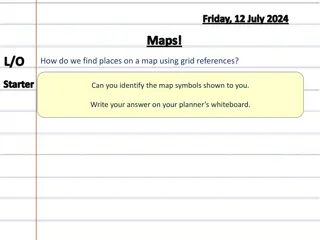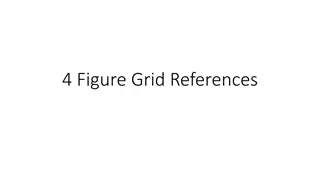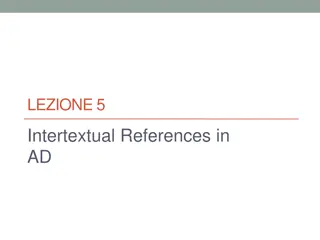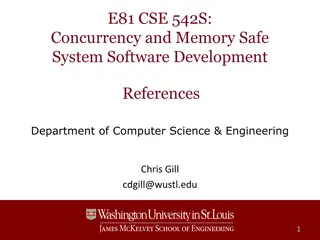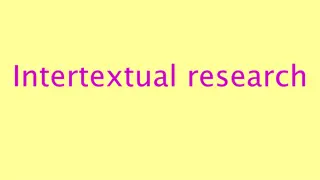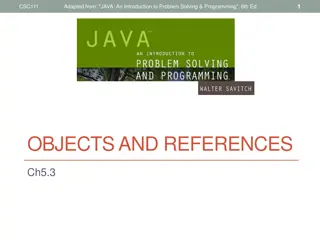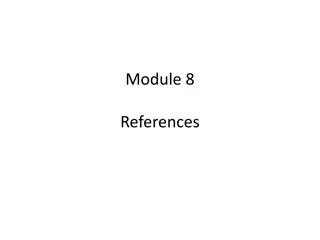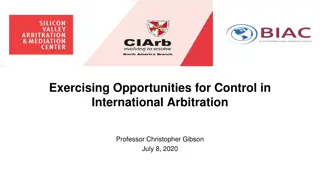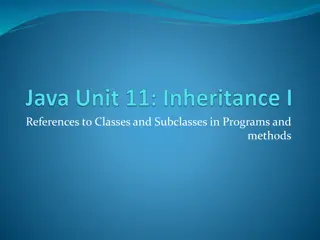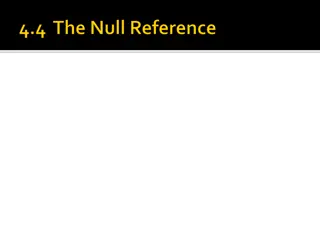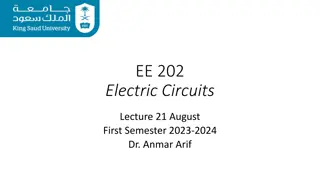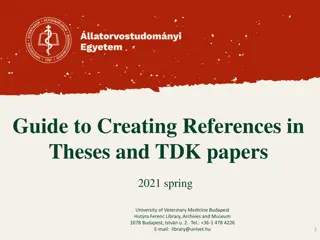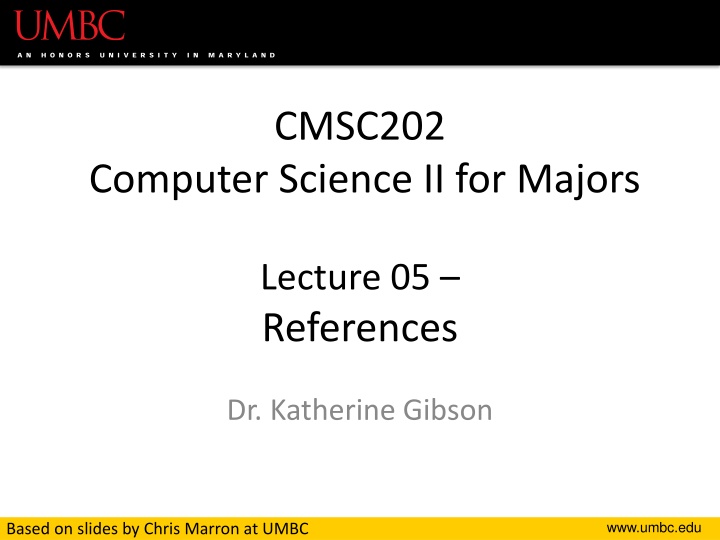
Pointers and References in Computer Science II
Explore the use of pointers and references in Computer Science II, covering topics such as variables, addresses, dereferencing, and passing arrays to functions. Dive into visualization examples to better grasp the concepts discussed in the lecture.
Download Presentation

Please find below an Image/Link to download the presentation.
The content on the website is provided AS IS for your information and personal use only. It may not be sold, licensed, or shared on other websites without obtaining consent from the author. If you encounter any issues during the download, it is possible that the publisher has removed the file from their server.
You are allowed to download the files provided on this website for personal or commercial use, subject to the condition that they are used lawfully. All files are the property of their respective owners.
The content on the website is provided AS IS for your information and personal use only. It may not be sold, licensed, or shared on other websites without obtaining consent from the author.
E N D
Presentation Transcript
CMSC202 Computer Science II for Majors Lecture 05 References Dr. Katherine Gibson www.umbc.edu Based on slides by Chris Marron at UMBC
Last Class We Covered Variables Values Addresses Pointers Creating Initializing Dereferencing Pointers and Functions Returning more than one value 2 www.umbc.edu
Any Questions from Last Time? www.umbc.edu
Todays Objectives To review and better understand pointers To discuss how pointers are used to pass entire arrays to functions To learn about references 4 www.umbc.edu
Review of Pointers www.umbc.edu
Visualization of Pointers int x = 5; int *xPtr = &x; /* xPtr points to x */ int y = *xPtr; /* y s value is ? */ x xPtr y variable name 0x7f96c 0x7f960 0x7f95c memory address 5 0x7f96c ? value 6 www.umbc.edu
Visualization of Pointers int x = 5; int *xPtr = &x; /* xPtr points to x */ int y = *xPtr; /* y s value is ? */ x xPtr y variable name 0x7f96c 0x7f960 0x7f95c memory address 5 0x7f96c ? value 7 www.umbc.edu
Visualization of Pointers int x = 5; int *xPtr = &x; /* xPtr points to x */ int y = *xPtr; /* y s value is ? */ x xPtr y variable name 0x7f96c 0x7f960 0x7f95c memory address 5 0x7f96c ? value 8 www.umbc.edu
Visualization of Pointers int x = 5; int *xPtr = &x; /* xPtr points to x */ int y = *xPtr; /* y s value is ? */ 5 x xPtr y variable name 0x7f96c 0x7f960 0x7f95c memory address ? 5 5 0x7f96c value 9 www.umbc.edu
Visualization of Pointers int x = 5; int *xPtr = &x; /* xPtr points to x */ int y = *xPtr; /* y s value is 5 */ x = 3; /* y is still 5 */ y = 2; /* x is still 3 */ x xPtr y variable name 0x7f96c 0x7f960 0x7f95c memory address 5 3 5 2 0x7f96c value 10 www.umbc.edu
Visualization of Pointers int x = 5; int *xPtr = &x; /* xPtr points to x */ int y = *xPtr; /* y s value is 5 */ x = 3; /* y is still 5 */ y = 2; /* x is still 3 */ x xPtr y variable name 0x7f96c 0x7f960 0x7f95c memory address 3 0x7f96c 2 value 11 www.umbc.edu
Pointers and Arrays and Functions www.umbc.edu
Arrays and Functions Because arrays are pointers, they are always passed by address to a function What does this mean? Program does not make a copy of an array Any changes made to an array inside a function will remain after the function exits 13 www.umbc.edu
Array Elements vs Arrays Passing one element of an array is still treated as pass by value For example classNums[0] is a single variable of type int, and is passed to the function by value classNums is an array, and is passed to the function by its address 14 www.umbc.edu
C-Strings and Functions Reminder! C-style strings are arrays of characters So functions always pass C-Strings by Address! Pass to a function by name only Just like any other array 15 www.umbc.edu
C-Strings as Arguments In a function prototype, that looks like this: /* function takes a char pointer */ void toUpper (char *word); char str[] = "hello"; toUpper (str); This is also a valid function prototype: void toUpper (char word[]); 16 www.umbc.edu
Passing Variables: 3 Options www.umbc.edu
Review: Passing by Value The default way to pass variables to functions // function prototype void printVal (int x); int x = 5; int *xPtr = &x; printVal(x); // function call printVal(*xPtr); // also valid call 18 www.umbc.edu
Review: Passing by Address Uses pointers, and uses * and & operators // function prototype void changeVal (int *x); int x = 5; int *xPtr = &x; changeVal(&x); // function call changeVal(xPtr); // also valid call 19 www.umbc.edu
Third Option: References References are Safer than pointers Less powerful More restricted in usage Use the ampersand (&) for declaration int &xRef = x; 20 www.umbc.edu
References Once created, references don t need to use the ampersand or asterisk They look like normal variables But behave (somewhat) like pointers References must be initialized at declaration References cannot be changed References can be treated as another name for a variable (no dereferencing) 21 www.umbc.edu
Functions and References Functions that take in references (instead of addresses) look almost identical to functions that take in normal values void changeByRef (int &x){ x = x + 1; } Prototype changes, but function body looks like that of a function that takes in a value 22 www.umbc.edu
Calling Reference Functions Calling also looks similar to functions by value void changeByRef(int &x); //prototype int x = 5; int &xRef = x; //create reference changeByRef(x); //function call changeByRef(xRef); //also valid call 23 www.umbc.edu
Downsides to References References are static Once initialized, they are forever tied to the thing that they reference Using them looks identical to using a value That s a good thing though? It s easier! But it can also be confusing May think you re passing by value, and that the contents of the variable won t be changed 24 www.umbc.edu
LIVECODING!!! www.umbc.edu
Announcements Project 1 has been released Found on Professor s Marron website Due by 9:00 PM on February 23rd Get started on it now! Next time: Classes and Objects 26 www.umbc.edu
Practice Problem Write a function called makeChange() that takes in a value in cents, represented as an int and then calculates the number of quarters, dimes, nickels, & pennies needed for change The function can take in multiple arguments The function does not return anything The cents value is guaranteed to be correct A valid integer, positive, etc. 27 www.umbc.edu

